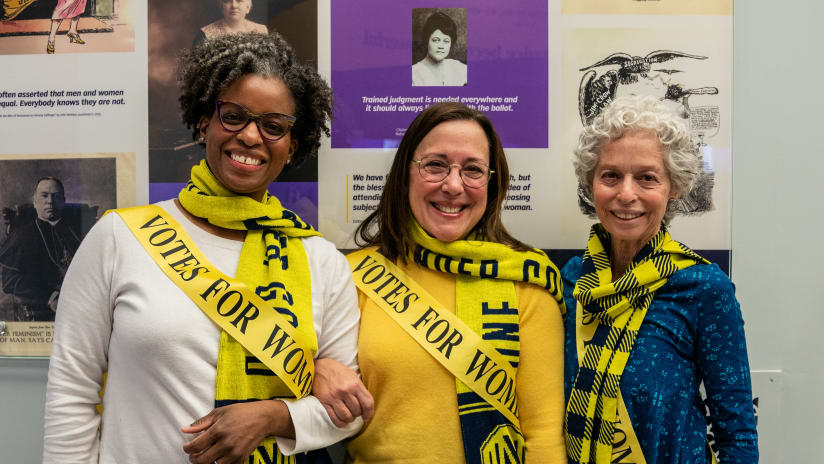The League of Women Voters of Tennessee walks in historic shoes. And those shoes date back 102 years.
In 1920, Tennessee became the epicenter of the women’s suffrage movement. The Nineteenth Amendment to the Constitution had been passed by Congress and was one state short of ratification. The Tennessee legislature was set to vote on the amendment in the summer of 1920, drawing women’s suffrage advocates and anti-suffragists to Nashville.
Carrie Chapman Catt, the founder of the League of Women Voters, was among those who came to the city to fight for the right to vote. And thanks to her work, as well as the lobbying of one legislator’s mother, the amendment was ratified by one vote.
“Harry Burn was one of the youngest legislators at 24, and he was going to vote no,” said Cindee Gold, a League of Women Voters member. “It was the popular thing to do to vote no. He received a note from his mother, Febb Burn. She said, ‘I need you to vote to give women the right to vote.’ So Harry decides to listen to his mother. He changes his vote, and it passes by one vote. The story is a civics lesson because every young person says, ‘Why should I vote? My one vote doesn’t make a difference.’ This is a time in history when it made all the difference in the world.”
The League of Women Voters (LWV) is a nonpartisan, grassroots nonprofit dedicated to empowering everyone to fully participate in the democratic process. With active Leagues in all 50 states and more than 750 Leagues across the country, the League engages in advocacy, education, litigation, and organizing to protect every American’s freedom to vote.
Even as the issues facing voters have changed, Tennessee’s LWV chapter still thinks back to those trailblazers in the summer of 1920.
“It’s absolutely amazing,” said Freda Player, a LWV member. “You think about it, and it’s like, ‘Oh, this was a hundred years ago,’ and you think, ‘Is this still relevant?’ It is still relevant with all the questions and issues that’ve gone around in the last elections, the need for women to have thoughtful conversations and have conversations with our community, typically the one-on-one conversations, that women have on a grassroots level. Whether it’s picking up a kid in the PTA line, going to the grocery store, or in the boardroom, having those conversations and making sure women have access to democracy is very awesome.”
Over time, the League’s mission has evolved, but its core values remain the same: education and engagement in civics. Those values have manifested themselves throughout Nashville’s history.
“The idea all along, even before women had suffrage, was that it wasn’t enough to have the right to vote if you didn’t know what to do with it,” said Debby Gould, the president of the League’s Tennessee chapter. “So, from the very beginning, it was all about how you inform people, but it was also about how you help people grow and understand issues and know what to do about them. So, for example, in Nashville, the LWV was one of the driving forces to move Nashville to a metropolitan government. It probably wouldn’t have happened without them. It was also a driving force in providing a lot of family and children services. A lot of issues like that that really matter.”
As Women’s History Month comes to a close in 2022, Gould said the celebration reflects not only progress, but hope for the future.
“Women’s history is just a powerful reminder of where we’ve been and where we’re going,” she said. “Sometimes we forget the individuals that have done astounding things that are just hidden in the past. And it’s so wonderful to uplift their stories and be inspired by them. We always hope with every one of these stories that there’s a young girl out there that says, ‘Oh my gosh, 100 years ago, 50 years ago, 20 years ago, there were women who were doing things that I want to do, and I want to be like them.’”
Learn more about LWV in Tennessee at lwvtn.org.















